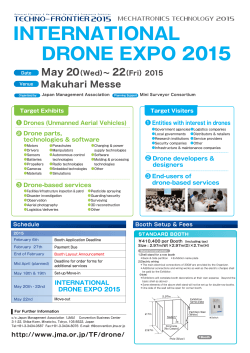
Drone Warfare - Child Victims Of War
Drone Warfare Drone warfare is part of a military shift away from conventional armed forces and declared warfare towards secretive and unaccountable killing. Lethal strikes from US drones have targeted populations in Afghanistan, Iraq, Libya, Pakistan, Yemen, and Somalia. Drones are not only operated by the US military, but by the CIA, and by America’s secret army, the Joint Special Operations Command (JSOC). (1) There are already around 60 military and CIA bases around the world connected to the drone programme and more are being planned. The UK has deployed drones in Afghanistan, Iraq and Syria; Israel has used drones in Syria, Lebanon, Sudan and Palestine; Iran is currently using surveillance drones in Iraq, and France in Mali. Drones are unmanned aerial vehicles (UAVs). They are aircraft which are controlled by pilots on the ground, often thousands of miles away from the action. The drones are used for three main purposes: to support ground troops under attack by launching missiles and bombs from the air; giving a 24 hr a day surveillance of the ground and observing the ‘pattern of life’; to conduct targeted killings. Although unmanned as in ‘pilotless’ it can take around 180 people to maintain a single orbit, the majority being analysts. (2) US drones used in Afghanistan, Pakistan and Iraq are controlled from Creech Air Force Base in Nevada and the CIA has its base at Langley, Virginia. The UK RAF drones squadron has been transferred from Creech Air Force Base to the RAF base at Waddington in Lincolnshire. The first drone strike from the UK took place on 30th April, 2013. The Royal Air Force operates General Atomics MQ-9 Reaper drone which carries GBU-12 Paveway 11 precision guided bombs and AGM-14 Hellfire air to surface missiles. Between 2008 and 2014, the UK conducted 5,214 sorties in Afghanistan, piloting both UK and US Reapers, and launched 510 weapons. Since October 2014 UK Reaper drones have been deployed in Iraq and in the first few months had accounted for one third of UK air strikes. UK drones are also being used for surveillance over Syria. The UK is the world’s top drone importer, taking 55 drones from Israel and six armed UAVs from the US - which adds up to more than a third of global deliveries between 2010 and 2014. (3) The WK450 Watchkeeper drone, a collaboration between Thales UK and the Israeli firm, Elbit, was finally deployed to Afghanistan in September just a few weeks before British withdrawal. Surveillance Drones are used extensively for surveillance i.e. selecting targets and observing the ‘pattern of life’ on the ground. This in itself creates terror amongst civilian populations who feel constantly spied upon. This ‘intelligence gathering’ has already resulted in hundreds of civilian deaths in Afghanistan and Pakistan where homes, schools or entire villages have been targeted. A recent UN report expressed concern that: “the mixed use of armed and surveillance drones has resulted in permanent fear in some communities, affecting the psychosocial well-being of children and hindering the ability of such communities to protect their children. Reports further indicate that the use of drones has a wider impact on children, especially their access to education.”(4) Lethal Strikes Drones are often implicated in targeted killing, a policy questioned by legal and human rights groups including Philip Alston, the UN Special Rapporteur on extrajudicial, summary or arbitrary executions. Targeted killing by the US increased after 9/11 and has been conducted not only by drones but by Apache helicopters and the bombing of family compounds. CIA drones, which do most of the assassinations, are reportedly piloted by civilians, including both intelligence officers and private contractors. The list of targets is approved by senior government personnel, but little is known about the criteria for inclusion. The CIA is not required to identify its target by name and decisions are often based upon surveillance and ‘pattern of life’ assessments. (5) The use of drones by the JSOC is even more secretive. Research by Reprieve has shown than targeted killing is very imprecise and many innocent people are killed. For example, attempts to kill 41 men resulted in the deaths of an estimated 1,147 people, as of 24 November 2014.(6) Drones are extending the killing fields by operating over countries whose governments may have given tacit approval, for example, Pakistan and Yemen. This allows the war on terror to be conducted against unlimited numbers of individuals and communities and, as in Pakistan, is resulting in the justification of increased numbers of suicide bombings. (7) New drone bases in Africa are now extending the shadow wars into that continent. International Humanitarian Law Drones may only be used when targets cannot be disabled or arrested by other means; civilians should be given adequate warning of imminent attack; drone attacks should not target nor affect civilians or potentially civilian persons or objects Neither the US nor UK appear to be adhering to these rules and there is a worrying lack of transparency. While the UK has only launched missiles from drones in declared war zones, its close intelligence sharing with the US makes it complicit in US covert drone strikes in Pakistan, Yemen, Somalia and Syria. References 1.Top Secret America’: A look at the military’s Joint Special Operations Command, By Dana Priest and William M. Arkin, September 2 2.Impact On Pace Of War Draws Scrutiny Aviation Week, July 8 2011 www.aviationweek.com 3.http://www.theguardian.com/news/datablog/201 5/mar/16/numbers-behind-worldwide-trade-indrones-uk-israel 4. Children and Armed Conflict, Report of the Secretary-General, 2013 5. Report of the Special Rapporteur on extrajudicial, summary or arbitrary executions, UN Human Rights Council, 28 May 2010 6. http://www.theguardian.com/usnews/2014/nov/24/-sp-us-drone-strikes-kill-1147 7. Drone bombing correlation to suicide attacks May 19, 2010 http://www.defence.pk/forums/u-sforeign-affairs/58900-drone-bombing-correlationsuicide-attacks.html Briefing by: Child Victims of War - updated 18.3.2015 Email: info@childvictimsofwar.org.uk Tel: 07890651970 http://childvictimsofwar.org.uk
© Copyright 2025





















